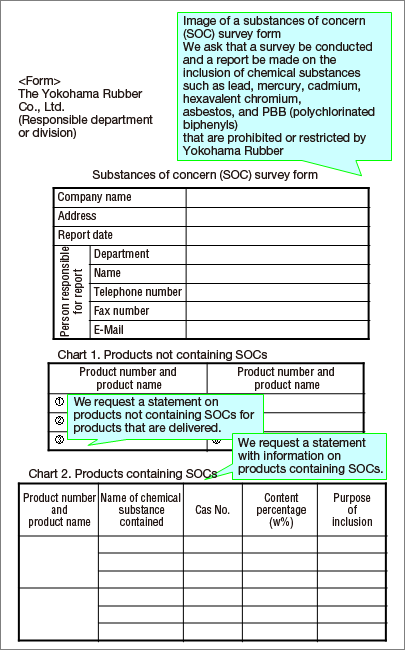Together with our Business Partners
Green Procurement
Yokohama Rubber has been working on the development and usage of raw materials to contribute to the environment under the cooperation of our business partners with preservation of forest resources, control global warming, usage of recycled raw materials, and expansion of non-petroleum raw materials as the main themes.
Furthermore, we manage parts procurement based on the Yokohama Green Procurement Guidelines. We ask that all suppliers confirm whether products contain SOCs (substances of concern) and ask that they submit a statement of non-use.
Preservation of Forest Resources
In order to preserve forest resources, we have abolished wooden pallets or wooden crates which we used to deploy massively in the past. We have almost completed switching all of them into recyclable metal pallets or plastic pallets. As for imported raw materials, we used to have some problems with extra costs incurred by using used pallets for re-export but this issue was closed at the last half of fiscal year 2009. These days we are trying to apply the same approaches at our overseas operation sites.
Also as for the paper made of wood as raw material, we were able to reduce year by year the amount of importing by addressing the company-wide reduction effort on paper usage. The amount of our paper purchase in FY2013 resulted in 55% in comparison to that in fiscal year 2006. As for the type of paper to use, we purchase paper classified as eco-friendly as the first priority.
Changes in Amount of Purchased Paper
| Fiscal Year | 2006 | 2009 | 2010 | 2011 | 2012 | 2013 |
|---|---|---|---|---|---|---|
| Purchased Amount (JPY1000) Comparison with FY2006 |
10,458 100% |
8,245 79% |
7,083 68% |
6,906 66.1% |
6,245 60% |
5,768 55% |
Suppress Global Warming
We are working to improve the fuel economy of automobiles by reducing the rolling resistance, which will in turn lead to reductions in the amount of CO2 emissions. To this end, we are working together with the manufacturers of raw materials in the development of raw materials for tires with low rolling resistance.
Also in terms of the transportation of raw materials, we contribute to the reduction of CO2 emissions by trying to have our overseas plants procure their raw materials from local suppliers to reduce CO2 through logistics operations.
Development of a new raw material for AAA tires
The development of new raw materials is essential for the development of low-heat tire tread rubber that is important for achieving the top grade of AAA for low rolling resistance. Actively encouraging suppliers of raw materials to optimize silica compounds as a key technology for achieving low heat has led to the birth of styrene-butadiene rubber equipped with the latest technologies and new silane coupling agents, serving as a driving force for the development of AAA tires.
Reduction of CO2 Emission through Transportation (Facilitation of Local Procurement)
Our plants in China made a big improvement in terms of local procurement. Also, our plants in the USA used to import some of the raw materials from Japan due to being unable to arrange them locally, but now they are able to purchase them from the local market. In addition, at our plant in Russia we have used local Russian raw materials.
Changes in Local Procurement in China
-
Changes in Local Procurement in our Suzhou Plant
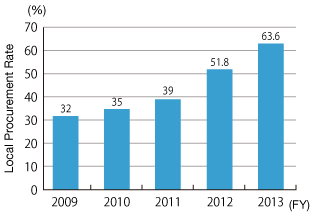
Changes in Local Procurement in our Hangzhou Plant
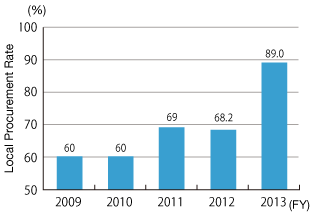
* The accounting period for the fiscal year of 2011 is from April to December. As such, data for the generated amount from January to March 2011 (fiscal year of 2010) has been added to this to provide a tally for the full calendar year.
Expansion of Recycled Raw Materials
In the past, recycled rubber used to be widely deployed as recycled raw materials for tires. However, blending this recycled rubber deteriorates their physical properties, so the applicable range of their parts was quite limited; we had some limitations as to its usage. Also, as for rubber powder generally available in the market, it is likewise with recycled rubber; it used to greatly deteriorate the physicality and was unable to be used for tires.
Yokohama Rubber had signed the Agreement of Co-Development with Lehigh Technologies, Inc. in the USA with "Micronized Rubber Powders" to undertake further fining down of rubber powders to go about research on the usage of rubber powder for tires.
As a result, if rubber powder is micronized, its physical property decreases very little. It was understood that the manufacturing cost (mainly electricity) of Lehigh Technologies would not increase so much. As a result micronized powder from rubber was enabled to be arranged into various kinds of compounds, which led to increase the usage of the recycled materials substantially. We anticipate the further expansion in the future.
Trend for Usage of Recycled Raw Materials (Recycled Rubber and Rubber Powders)
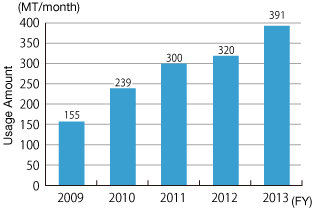
* Calculated from April 2011 to March 2012 for 2011, and January to December for 2012
None Petroleum-Base Raw Materials
In order to phase out from raw materials being dependent on petroleum as soon as possible, we are currently in the midst of development under collaboration with our business partners to develop non-petroleum-based raw materials as our main raw materials.
Switching from Carbon Black into Silica
Carbon black is the essential raw material for rubber; it is manufactured through imperfect combustion of petroleum-based oil or charcoal-based (tar-based) oil, as such it is not considered as high in extraction rate. At the same time, silica's basic raw material is from sand, which is almost unlimited in supply; the good thing about silica is to limit the usage of petroleum-based resources but its negative aspect is it is fairly expensive and not easily being blended with rubber. We are thus able to overcome this problem by selecting Silane Coupling Agent and development of blending machines; upgrading to the preceding methods is currently taking place gradually.
Changes in our Usage Amount of Carbon Black and Silica
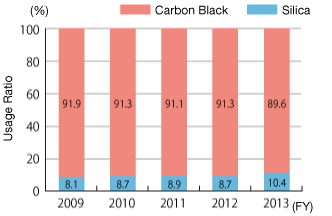
* Calculated from April 2011 to March 2012 for 2011, and January to December for 2012
Usage of Plant-Based Oil
In the past, petroleum-based oil was the mainstream as the oil for rubber. Plant-based oil was unable to be used due to its poor compatibility with natural rubber or synthetic rubber such as SBR. Under collaboration with our business partners, we were able to develop orange oil which is high in compatibility with the preceding rubber types; we are now able to use it as high grip oil.
Yokohama Green Procurement Guidelines
With the management of chemical substances contained in products as a form of entrance control, we ask that suppliers work towards environmental preservation and manage procurement items in accordance with our Green Procurement Guidelines. Furthermore, based on our Green Procurement Policy, we purchase raw materials, outsourced items, subsidiary materials, and equipment in accordance with environmental footprint standards.
A revised English version will be prepared for distribution to business locations overseas.
Green Procurement Policy
We procure raw materials, parts, packaging, etc. that are environmentally friendly, clean, and safe.
- We make decisions on procurement and purchasing based on the status of environmental management system adoption by each supplier.
- We work to thoroughly prevent the inclusion of substances of concern (SOCs).
- We promote the purchase of environmentally-friendly products (green procurement).
- We reduce waste.
Specifically, we confirm (1) the status of environmental management system acquisition, (2) the status of environmental preservation initiatives, and (3) the status of substances of concern (SOC) management systems. As a requirement for products to be procured, we request the submission of documents such as (1) a substances of concern (SOC) survey form and (2) a pledge of non-inclusion. An image of substances of concern (SOC) survey form is displayed for reference.
Image of a substances of concern (SOC) survey form
